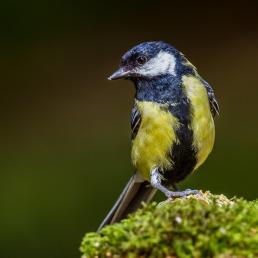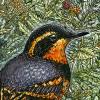

Join BirdNote tomorrow, November 30th!
Illustrator David Sibley and actor H. Jon Benjamin will face off in the bird illustration battle of the century during BirdNote's Year-end Celebration and Auction!
House Finches are evolving rapidly and visibly. In 1941, some captive House Finches from California escaped near NYC. They spread rapidly and are now found across most of the US. We know the finches have evolved, because those that survive differ from their parents. Size is one example. Male House Finches in recently established populations are larger than the males that escaped. Females have become smaller and survive better than larger females as nestlings. Evolutionary changes are occurring visibly all around us.
BirdNote®
Birds Are Evolving Rapidly – Today
Written by Gordon Orians
This is BirdNote.
[Song of House Finch]
Many people think that evolutionary change occurs so slowly, we cannot observe it directly. Not so! For example today in the U.S., House Finches are evolving rapidly and visibly. [Song of House Finch]
In 1941, some captive House Finches from California escaped near New York City. They spread rapidly and are now found across most of the United States and in southern Canada. Many of these areas have cold, snowy winters, during which many birds die. The finches have evolved, because those that survive differ from their parents. Size is one example. [Cold winter wind]
Male House Finches in recently established populations in Michigan and Montana are larger than the males that escaped. Large males out-compete small males for food, so are more likely to survive the winter. They also pair more successfully with females early in the spring.[Song of House Finch]
Smaller females survive better than larger females as nestlings. Also, because they need less food to maintain their own bodies, they can breed earlier in spring. Females that breed earlier raise more young than those that start breeding later. [Chatter of several House Finches]
Rapid evolution of House Finches, reminds us that evolutionary changes are occurring visibly all around us.
For BirdNote, I’m Michael Stein.
###
Sounds of the birds provided by The Macaulay Library of Natural Sounds at the Cornell Lab of Ornithology, Ithaca, New York. Song 105669 and call 44976 of the House Finch recorded by G.A. Keller.
BirdNote’s theme music was composed and played by Nancy Rumbel and John Kessler.
Producer: John Kessler
Executive Producer: Chris Peterson
© 2015 Tune In to Nature.org December 2014/2015 February 2023 Narrator: Michael Stein
ID# evolution-02-2015-12-2
References:
https://sora.unm.edu/sites/default/files/journals/auk/v095n03/p0528-p05…
https://pubmed.ncbi.nlm.nih.gov/10937271/








